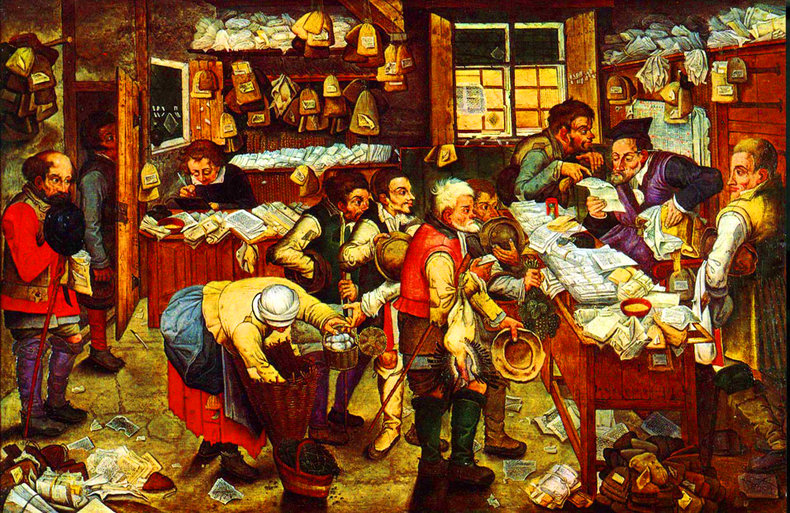
Regressive Tax
A regressive tax is a tax that places a higher burden on the poor than the rich. For example, a tax on food impacts low income families more than the high income because low income families typically spend a higher proportion of their income on food.Progressive Tax
A progressive tax is a tax that places a higher burden on the rich than the poor. For example, a progressive income tax charges a higher marginal rate as your income grows. A progressive tax is typically designed to retain healthy incentives for productivity, hard work, risk taking and entrepreneurship.Direct Tax
A direct tax is a tax that is visible to the person who is paying it such as income taxes that are filed by a small business.Indirect Tax
An indirect tax is a tax that is included in the cost of something without any transparency. For example, a tariff that dramatically increases the price of shoes in a nation without consumers knowing that it exists.Double Taxation
Double taxation is when the same income, wealth or transaction is taxed multiple times. This can occur when you are taxed in two different countries for the same income. For example, a dividend paid in the United States that collects withholding taxes only to be taxed again in the receiver's home country. In principle, most countries try to avoid double taxation and this is the goal of tax treaties between countries. Double taxation can also occur where corporate earnings are taxed and then taxed again as capital gains and dividends to shareholders.Income Tax
A tax on income. Usually progressive. Creates disincentives for work, productivity, entrepreneurship, risk taking and investment.Negative Income Tax
A nation that offers a tax refund that exceeds tax payments for people below a certain income level. This is often viewed as a partial refund for consumption taxes.Sales Tax
A tax that is only applied to sales to consumers. Usually a percentage of the total sale amount such as 5%.Value Added Tax
A tax that is applied only to the value added at each step in the supply chain. For example, if a baker sells apple pies for $5 that cost $2 to produce, the tax would be applied to the $3 of value added by the baker. Unlike a sales tax, the value added tax is applied each time the goods change hands.Consumption Tax
A tax on spending such as sales tax or a value added tax. This is often regressive because lower income individuals spend most of their income and higher income individuals tend to save and invest. Creates incentives to save and disincentives to spend. An unusually high consumption tax creates incentives to spend your money in another country such as on vacation.Luxury Tax
A special consumption tax that is applied to expensive items such as cars, boats and jewelry over a certain price. This fights the tendency for consumption taxes to be regressive. It also encourages the upper class to reinvest their capital as opposed to spending it. As the rich tend to travel, this may have a limited effect for goods that easily cross borders.Tourist Tax
Taxes that target tourists such as hotel taxes and departure taxes that are applied to departing flights. This may be designed to reduce overtourism and to have tourists pay their share for public services and infrastructure. Reduces the competitiveness of a tourist destination.Tariff
A tariff is an tax applied to imports into a nation. This is usually paid by producers or supply chain intermediaries such that it is an indirect tax. A tariff is used to implement a policy of protectionism and are reduced or eliminated by free trade agreements. A tariff can also produce significant revenue and resembles a hidden consumption tax.Wealth Tax
A wealth tax, or capital tax, is a tax on the net wealth of an individual. These are usually progressive and often grant a complete exemption to individuals below a certain net worth. A wealth tax is complex to calculate and administer as the value of assets can change with no certain market value. A wealth tax tends to cause capital flight. Wealth taxes can represent a high burden for retired individuals.Inheritance Tax
A tax on money received from an inheritance. These are extremely unpopular as they often require the sale of property that has been inherited in order to pay the taxes on it. As such, there is often a exemption for an inheritance below a certain value. Do to their unpopular status, many nations do not have an inheritance tax.Estate Tax
A tax on the estate of a person who has died. Just as unpopular as the inheritance tax. The inheritance and estate tax often do not apply to a surviving spouse†.Gift Tax
A tax on transferring assets to another person such as cash, property or stocks. These are usually a backstop to estate and inheritance taxes as a gift is a popular method to reduce these obligations.Property Tax
A tax on a property based on its appraised value. If this tax becomes overly burdensome, properties may be abandoned. In some cases, property taxes differentiate between a primary residence and an investment property. Property taxes may also differentiate between foreign and local owners as a means to discourage foreign purchases that drive up prices and leave properties abandoned.Land Transfer Tax
Taxes applied to the value of a real estate transaction. Discourages house flipping. This can also discourage home ownership creating social instability.Stamp Duty
A stamp duty is a tax that is levied on documents related to things such as legal contracts and registration of land, marriages and businesses.Transaction Tax
A tax on financial transactions such as stock trades or currency exchange. Typically meant to prevent speculative trading or automated trading such as high-frequency trading. This can decrease the liquidity and efficiency of markets.Registration Fees
Fees for mandatory government registration services related to businesses, professions, activities, events, equipment and property.Service Fees
Fees for the use of public services such as a fee for a highway or medical treatment.Social Insurance
Mandatory fees for medical insurance, pension, unemployment insurance, disability insurance and other social programs.Payroll Taxes
Taxes that employers and employees pay, usually as a percentage of total income. These include social insurance and a variety of special taxes for employers based on each employee's salary. Payroll taxes represent a disincentive to employ people.Self Employment Taxes
A tax on self-employed individuals that mirrors payroll taxes. These can represent an administrative and financial burden that heavily discourages entrepreneurship.Corporate Taxes
Taxes on the income and/or capital of a corporation or similar legal entity. These are often double taxed such that accumulated earnings are taxed again when paid out to the owners as dividends or capital gains. Where this double taxation is overly burdensome there is low incentive for putting capital to work, risk taking and entrepreneurship.Gross Receipts Tax
A tax on the revenue of a business. This resembles an excise tax or sales tax that may simply be passed to the consumer. A gross receipts tax is often used by a jurisdiction that has trouble collecting taxes from large multinational corporations. In some cases, a gross receipts tax targets a particular industry. A gross receipts tax is difficult for entrepreneurs who may be operating a business at a loss such that they are paying taxes while losing money. As such, it has a negative effect on small business, risk taking and may increase consumer prices. Yet another problem is that they are burdensome for low margin industries and during a recession when earnings may be negative.Surtax
An additional tax based on how much tax you have paid. Often used to fund a government program such as healthcare. A surtax is often progressive. For example, it may only be applied to individuals with a reasonably high income.Sin Taxes
Taxes on products and services that a government views as unhealthy or problematic such as alcohol, tobacco, soft drinks, fast food and gambling. These are criticized as being paternalistic whereby a government feels a need to discourage certain lifestyles. Where a government provides public healthcare, sin taxes may be a partial recovery of the healthcare costs produced by an unhealthy product. Sin taxes are regressive as they can represent a significant cost for low income individuals.Pigovian Tax
A tax on products and services that generate economic bads such as pollution. For example, a tax on gasoline and gasoline burning vehicles. This is a way to partially recoup the costs to society of economic bads. A pigovian tax creates incentives for innovations that reduce pollution and other economic bads.Excise Taxes
Taxes on specific goods that are charged to the producer that passes along the cost to consumers. These are often sin taxes, pigovian taxes or luxury taxes.Inflation Tax
An inflation tax is the inflation that is created by a monetary authority expanding the money supply. For example, a government may effectively "print" money to pay for expenditures and to service debt. A small amount of inflation encourages individuals to invest their money in order to preserve its value and can be viewed as creating positive economic incentives. High rates of inflation can damage an economy and lead to economic problems up to including hyperinflation whereby normal economic functions completely break down. An inflation tax is not a true tax but has similar costs.Capital Gains Tax
A tax on positive gains on the sale of an asset generally defined as the difference between the purchase and selling price. These create disincentives to invest or to sell an asset such as your home. Capital gains taxes can also create double taxation. For example, a corporation pays taxes on its income but then investors are also taxed on the appreciation in stock price that occurs due to this income. Another problem with capital gains taxes is that a "gain" may simply be the result of inflation.Exit Tax
An exit tax, or expatriation tax, is a tax on an individual who ceases to reside in a country. This often takes the form of a capital gains tax whereby all an individual's assets are considered sold when they leave the country. An exit tax is particularly hard on foreign workers who may accept a position abroad only to find that they are taxed on all their worldwide assets when they want to leave. This can also become a double tax as the assets aren't actually sold such that they will likely be taxed again when they are sold. Exit taxes may be applied in nations with oppressive tax regimes that experience significant capital flight.Dividend Tax
A tax on dividends received by shareholders. Often represents a type of double taxation. Creates disincentives to invest and for companies to payout earnings.Notes
The information above is general information that has international scope. The taxes above may or may not exist in your jurisdiction. Likewise, our commentary is extremely general and is not intended as tax advice.Footnotes
† It is rare to charge inheritance or estate tax on property left to a spouse. In fact, fifteen OECD countries levy no taxes on property passed to close family. One notable exception is Japan that applies an estate tax of up to 55% where there is a surviving spouse. This also happens to be the world's highest estate tax. Japan's tax system is an interesting case study in perverse incentives as in some cases inheritance is refused due to the high estate, property and land transfer taxes leaving houses abandoned and unclaimed.| Overview: Tax | ||
Type | ||
Definition | A tax is an involuntary fee that is demanded by a government under threat of penalty. | |
Related Concepts | ||







































